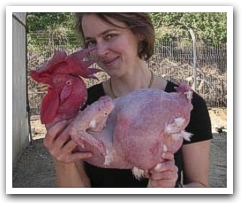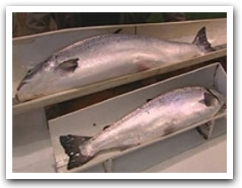Animal Pharm, Episode 1
On June 15, Channel News Asia featured "The Animal Pharm (Episode 1)", a documentary that explores the world of selective breeding, transgenics and cloning. This web page is an attempt to present a more tangible resource for understanding; no attempt is made to evaluate the documentary.|
The show begins with outlandish animals which can be produced by selective breeding - from Belgian Blue cattle with massive muscles to bald chicken with no feathers. Belgian Blue cattle are a heavy-built breed, producing large amounts of meat and muscles. The sculpted and muscled appearance known as "doubled muscled" is caused by a gene that suppresses the production of Myostatin, a protein that inhibits muscle tissue growth after a certain point of development. |
|
| Meet the Super Cow |
| Bald Chicken | Next came the bald chicken that needs no plucking. According to BBC News, the "creator" Professor Avigdor Cahaner said, "This is not a genetically modified chicken - it comes from a natural breed whose characteristics have been known for 50 years ... I am just transferring that to fast growing broiler chickens. It's a normal chicken except for the fact it has no feathers." Read more ... |

|

|
But selective breeding takes generations to accomplish and is imprecise. The breakthrough came when scientists could identify, extract and transfer specific genes from one specie to another. Entering into the world of transgenics, we encounter glow-in-the-dark rabbits with a jellyfish gene in their DNA. Transgenics is presented as an advantage for medical research ... the gene being used like a fluorescent marker pen to track cells following organ transplant, and to find new treatments for blindness and bone disease. However, note that this green fluorescent protein (GFP) permanently changes the genetic makeup of the recipient and can pass on to future generations. |
| Glow-in-the-dark Rabbit |
| Super vs Standard Salmon | We have seen how genetic modification can be used in medicine but what happens when it is used in food? Salmon normally grow in warm water and not during winter but with the help of genes from other fishes, the salmon is genetically modified to grow all year round whatever the water temperature - growing 4-6 times faster than normal. What would happen if a super salmon escaped into open waters and breed with wild salmon? What is their impact on the world's (already devastated) wild fish stocks? Assurance was given that the super salmon is sterile and there is no possibility that their transgenes will escape into the wild gene pool. |

|
Vitamin A deficiency is a condition that kills 2.5 million people a year. It causes blindness, suppresses the immune system and ultimately causes death from common infections. Golden rice, a transgenic plant which produces beta-carotene in the endosperm, is presented as part of the solution to combat vitamin A deficiency and save millions of lives in the developing world.
We meet the all-new Enviro pigs, which carry a man-made gene that makes their manure low in phosphorus and thus environmentally friendly. Earlier in the show, we are told that the super salmon is more efficient in feed conversion -gaining 30% more weight per gram of feed - and produces less waste and therefore less damaging to the environment.
Finally, we enter into the world of cloning - the duplication of life itself. What is the cloning process? First, genetic material is removed from an unfertilized egg cell using a fine glass pipette. Next, an electric shock is used to fuse a cell from a donor animal with the empty/blank egg cell. The resulting embryo is then implanted in a surrogate mother which carries it to term and delivers it like her own offspring.
Watch an animation of Animal cloning + how Dolly the sheep was created ...Then we meet Clayton, the clone of the legendary barrel racehorse Scamper. His owner, Charmayne James decided to clone him because Scamper is a gelding in order to use his exceptional genetics in her breeding program. However, the question was raised as to whether genetics alone account for Scamper's outstanding performance at world championships.
Now, try cloning a dog using the same method to create Dolly.
The documentary ends with the possibility of growing meat in a petri dish in a lab - meat without the animal. Is this food of the future?